Buzz Blog

For
the theatre goer this month there are a couple of plays that are
looking to delight and intrigue the minds of the masses, by two Utah
based companies who are making efforts to raise their game this year.
We'll start this week with a brand new production featuring the lives
of two local figures, bound together only by their claimed location and their
shared first name. 
--- Wallace will make its worldwide
debut tomorrow night at the Rose Wagner, a Plan-B production focused
on the lives of Wallace Stegner and Wallace Thurman, taking what was
essentially two one-act plays and linking them together into a two
man performance. We chatted with Jerry Rapier briefly last week in
print (and briefly at the end today), so this week we talk to the two women who wrote the plays,
Debora Threedy and Jenifer Nii. As well as the actors taking part,
Carleton Bluford and Richard Scharine.
Richard
Scharine, Carleton Bluford, Debora Threedy & Jenifer
Nii


http://www.planbtheatrecompany.org/
Gavin:
Hey guys, first off, tell us a little bit about
yourselves.
Richard:
I’m a Professor Emeritus from the University of Utah Theatre
Department where I taught from 1978 to 2005, following teaching
stints at three other junior colleges and colleges and directing
community theatre. I’ve always taught history and literature
(including as a Senior Fulbright Lecturer in Poland and with the
London Study Abroad Program), but I have participated in theatre
enough to have directed 90 plays and acted in ten states and seven
foreign countries.
Carleton:
Well, my name is Carleton Bluford, I'm from North Ogden, I've
been in the arts since I was young and I love theater.
Debora:
I’m originally from Chicago. I’ve lived in Utah about 24 years.
In my day job, I’m a law professor at the U.
Jenifer:
Idaho native, graduate of the University of Utah. Former reporter
for the Deseret News, now working in internal communications for a
local healthcare organization.
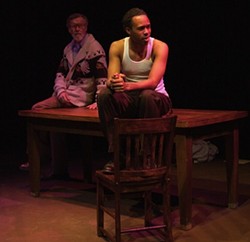
Gavin:
What inspired all you to take an interest in theater?
Jenifer:
A friend took me to see Marsha Norman’s play Getting Out,
which completely bowled me over. I went back maybe 6-7 times during
the course of the run.
Debora:
I saw my first live stage play at the age of sixteen. Going to the
theater wasn’t something anyone in my family did. And I went to
Catholic schools, which didn’t have the resources for things like
school plays. I still remember that first production: A Day In The
Death Of Joe Egg. I was blown away. About the same time I got
involved in forensics at school (a type of public speaking with
competitions between schools) and my coach suggested I take some
acting lessons to help me overcome my stage fright (it worked). Put
the two together and I was hooked. I majored in theater in college
and actually worked in theater full time for a few years, before
deciding that I couldn’t handle the job insecurity, which is when I
decided to go to law school.
Carleton:
My mother mostly, who is an actress, Dawn Bluford. But it was the
way that you can effect people through theater that got me
hooked.
Richard:
I was always pretending as a kid on the farm. (My family called it
“wool gathering”.) When I was acting on tour in the common room
of an English public school in 1978 I noticed how the two doors on
opposite sides at the front of the room replicated both the
Elizabethan theatre and the one-room schoolhouse where I went to
grammar school. In the second of my junior years in college it was
clear I had no future as a football player, left the uniform in the
locker one night and went to a play tryout. Fifteen days after I got
out of the Army I married my frequent co-star, and two weeks after
that we were in graduate school.
Gavin:
Jennifer and Deborah, where did you each get the idea to write plays
for your subjects? And how did things come about to combined them
into one play?
Debora:
In the fall of 2008 the Stegner Center at the U put out a call for
proposals to help celebrate the centennial of Stegner’s birth
(2009); I submitted a proposal for a one-man one-act play about
Stegner’s life. The proposal was accepted. I asked Jerry to
direct it (it was performed at the Stegner Symposium in March 2009).
At some point while we were working on that, Jerry asked me if I’d
be willing to combine the Stegner piece with another one-act written
by a different playwright, and I was game.
Jenifer:
Jerry Rapier asked if I’d be interested in the idea. I jumped at
the chance.
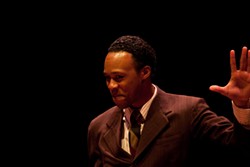
Gavin:
What's your take on each other's plays and how they work together as
a whole?
Jenifer:
At first glance, there probably aren’t two more dissimilar men.
One white, one black, one straight, the other gay, one a
writer/advocate for the West, the other a writer/advocate for a
movement born in the east. One lived a good long life, while the
other’s was terribly short. You wouldn’t think they’d have
anything to talk about. But I’ve been amazed at the resonances
we’ve discovered. You’ll have to see the play to see what I mean,
I think. But for me, at least, it really was a bit breathtaking.
Now, what’s my take on Debora’s play? I think it’s lovely. It
has depth and perspective and wisdom. Debora let's Stegner speak,
which I think is quite powerful.
Debora:
I think Jenifer’s piece is amazing. In my piece, I’ve basically
cut and pasted Stegner’s own words, from a variety of sources.
Jenifer had a lot less to build on and so her piece is more original.
And every time I hear the two pieces read together I’m struck by
the resonances between the two. Which is pretty amazing, considering
the two of us didn’t communicate at all while we were writing our
separate pieces.
Gavin:
What eventually led to having Jerry direct it, and what do you think
of his approach to the material?
Debora:
I already spoke about how I first asked Jerry to direct the Stegner
piece, and then he grew it into this larger project. And I love his
idea of “braiding” the two stories together. In other words, the
audience won’t see one act devoted to Stegner and another act
devoted to Thurman. Instead they’ll hear a piece of Stegner and
then a piece of Thurman, and then another piece of Stegner, and so
on. I want to point out that the final script for Wallace is
actually the work of three people: Jenifer and I wrote our separate
pieces, but it’s Jerry who has done the intertwining of the two
stories into one piece.
Jenifer:
Jerry was always going to direct it, I think. His approach to the
material? A thing about Jerry: he’s one of the smartest men I’ve
met, and also one of the bravest and most perceptive and
inspirational. For the Wallace project, Jerry brought Debora
and me together, outlined the broad concept, gave us a deadline, and
sent us on our way. Debora and I wrote completely independently of
one another. It was only when we’d turned in our drafts that Jerry
saw what he had to work with. He did all the work knitting the two
pieces together. The whole thing was an experiment, and an enormous
risk.

Gavin:
Richard and Carleton, what was it about this particular play that
caught your eye to audition for it?
Richard:
I probably knew as much about Wallace Thurman as I did Wallace
Stegner, having taught about him in theatre history. I’d read
Stegner’s Joe
Hill before directing The
Man Who Never Died at the
Communication Workers of America Union Hall for the 75th
anniversary of Hill’s execution. I’d played Frank Sweeney when
Jerry directed Brian Friel’s Molly Sweeney
and liked the Plan-B policy of doing political theatre using local
subjects. I also felt that at my time of life I needed a challenge
to firm up my acting chops.
Carleton:
Actually, I didn't audition for it. I was brought in to read for it
during its creation stage. And once it was complete, I guess they
just decided I was the man for the job.
Gavin:
How was the audition process like for you and what was it like
getting the part?
Carleton:
Well, I like to think of it as one of the biggest challenges of my
life. You can't get much more lead than this and I want to make sure
I do it justice. So I guess, getting the part was like a delicious
blend of triumph and fear.
Richard:
When I read an earlier version of Debora’s script, I
realized—other than the enormous gap in talent and
accomplishment—how much I shared with Stegner in terms of
background, the challenge of finding your way from an agrarian milieu
to academia and the arts, the sense of always being an outsider, and
the need to protect yourself from being exposed. For the audition I
chose a section about Stegner’s family and did the lines while
passing around old photos of my
family on the farm in the 30s and 40s, in the attempt to create the
illusion that if anyone in the room knew where Stegner was coming
from, it was me.
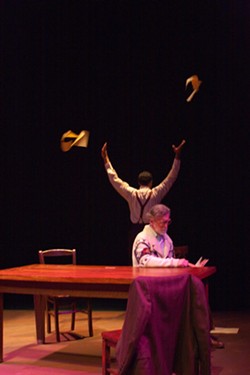
Gavin:
What has it been like fitting into these roles for you both, and
what challenges have you met in perfecting your
performance?
Richard:
English Professor Emeritus Robert Steensma taught a course on
Stegner’s novels through the Osher Institute in the Fall, so the
first thing I did was to sign up for that. The biggest challenge in
the dialogue, other than its length, has been its precision. It
gives the sense of being utterly casual, but you substitute or
paraphrase at your own peril. I was likely chosen for my
professorial mien and delivery, and yet, heaven help the audience if
I turn it into a lecture. With three-quarter round staging and a
minimal set, movement has to be precise as well, and it’s fair to
say that God has blessed me with a frame that is sturdy, but utterly
lacking in grace.
Carleton:
Well, the challenge for me has been with the character himself. No
one has really heard of him so it's my job to play him very
accurately and clear. I'm doing what I can but it's really Jerry
who's perfecting the performance. In a rehearsal once, he said, "I'm
not interested in doing a good show, I'm interested in doing a great
show!" So the challenge is doing just that, every night.
Gavin:
Being the only two on stage, how has the interaction been for you
both in sharing the stage?
Carleton:
Easy. He does his thing and I do mine and it works. Thanks to
Jerry.
Richard:
Carleton has the easiest disposition in the world to work with, and
it’s great fun to watch him perform. The problem is that I can’t
always do that. It’s very seldom that Stegner and Thurman make
note of the other’s presence, and I don’t always remember when
that is.
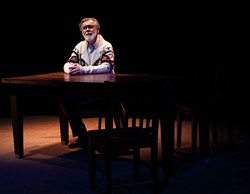
Gavin:
Going into opening night, what are your overall thoughts on the
production?
Jenifer:
The first thing that pops into my head is how absolutely crazy I am
for Carleton Bluford (Wallace Thurman). What talent! But overall,
I’d have to say that I feel a bit tumbled-over by fortune and luck
and all that good stuff. Plan-B really is a special company, and I am
honored to be a part of their season.
Debora:
I’ll be as curious as anyone to see how it turns out.
Richard:
Which opening night? The dress rehearsal, which will be largely
populated by students from my American Political Theatre class, and
actors from People Productions, the African-American themed-theatre I
co-founded in 2000? The preview, in which the audience will be from
the Stegner Center? Or the offical opening night in which the
audience will be sitting there waiting to see what a gay black
playwright from Utah looks and sounds like? Those will be three very
different audiences, which should keep the actors on their
toes.
Carleton:
It's a good show, I hope that the audience will take something new
away from the show and have a better understanding of who these
people are and of Salt Lake City.
Gavin:
A bit state-wide, what are your thoughts on local theater, both good
and bad?
Carleton:
Locally, we are doing some great things in Utah. There are people
here who raise the bar year after year and Plan-B is one of those
companies who does just that.
Debora:
The good is that for such a relatively small state, population-wise,
there’s a lot of theater going on. The bad is that the theater
community is really pretty small, and sometimes it feels a little
in-grown.
Richard:
I don’t get out of Salt Lake City enough to make valid statewide
conclusions. Other than the occasional venture down to the USF in
Cedar City, and even rarer trips down to the Y, I’m woefully
ignorant of theatre outside the Capitol. Locally, it appears that
we’re well served with theatres which have reasonably clear
missions. PTC tries to give us the big picture, Hale focuses on the
family (yes, there is probably both a political and a religious
implication there), and both SLAC and Plan-B do largely new works.
Plan-B differs in that its works usually have a local connection.
PYGmalion’s stated concern is women, Pinnacle does modern American
classics, Utah Contemporary chooses with its actors in mind, and
People Productions does African-American scripts. The Gay Theatre
question (the theatre “that will not speak its name”) finds a
home at several of these at one time or another. If I left somebody
out, I do sincerely apologize.
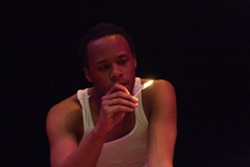
Gavin:
Is there anything you believe could be done to improve it?
Richard:
We need more small performing spaces, and we need more media
coverage. I have no problem with the big touring shows that arrive
occasionally at the Capitol Theatre or Kingsbury Hall, but even
Broadway can’t fill its Broadway-sized theatres. We don’t need
to spend tax dollars on such a mausoleum in Sandy or anywhere else
Ralph Becker’s brother wants to put it.
Carleton:
As long as people do what they love and try their best to affect
people through the arts in a positive way, it will keep improving on
its own.
Debora:
More money would be nice. And more small venues. With "Broadway coming to Utah"... It’s not really my thing, so I don’t have any insights one way
or the other. I like my theater small and intimate, not blockbuster
size.
Gavin:
What can we expect from all of you over the rest of the
year?
Jenifer:
I’ll be participating in the Plan-B/Meat & Potato Theatre’s
Script-In-Hand series this spring, and Plan-B’s And The
Banned Slammed On event in May. Beyond that, I just hope to keep
on getting better at this writing thing.
Carleton:
Hopefully more African-American shows, writings and socially
conscious theatre.
Richard:
I’ll be directing the last reading of the Edward Lewis Black
Theatre Festival, Alice Childress’ Wedding
Band, which will be done in the
Rose Wagner Black Box on April 5. As a Plan-B participant I’m also
committed to And the Banned Slammed On
on May 1.
A week later I’m off to teach in the London Study Abroad Program
(you’re all welcome to come!) for a month and a half. People
Productions will produce a as-yet-unchosen play in the summer and do
another performance of The Exonerated
as a fundraiser for the Rocky Mountain Innocence Center in the
Fall.
Debora:
I have a new one-act play being read next month as part of the
Script-In-Hand
series sponsored by Plan-B
and Meat & Potato. It’s part of a larger project I’m working
on, two maybe three one-acts inspired by my experiences as a woman
law student and lawyer. I’m trying to integrate the disparate
pieces of my life, by writing plays about the law. I’m also
working on a collaboration with a friend; the play is based on the
biography of a South African black man and his partnership (in both
the business and personal senses of the word) with a white man, all
during the era of apartheid. Finally, I’m looking for someone to
produce my play about Sally Hemings and Tom Jefferson, which in one
of the most bizarre coincidences I’ve ever heard of, is one of
three plays written by local playwrights on the same topic. Must be
something in the water.
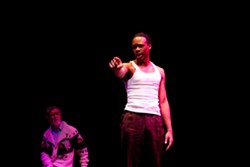
Gavin:
Aside from the obvious, is there anything you all you'd like to promote or
plug?
Jerry Rapier: Yes! There
is a series of events happening in conjunction with Wallace—Ken
Sanders/Trent Call’s Uconoclast art show; Theatre Arts
Conservatory’s Shakesitement: Tired Of Being Bard; two free
film screenings at the Tower—“Brother To Brother” and “Wallace
Stegner”, a benefit preview performance for the Wallace Stegner
Center; a free reading of People Productions’ The Talented
Tenth; and the re-launch of the Script-In-Hand
series. Our next production, Amerigo, runs April 8-18. And our annual fundraiser, And The Banned Slammed On, goes up May 1.